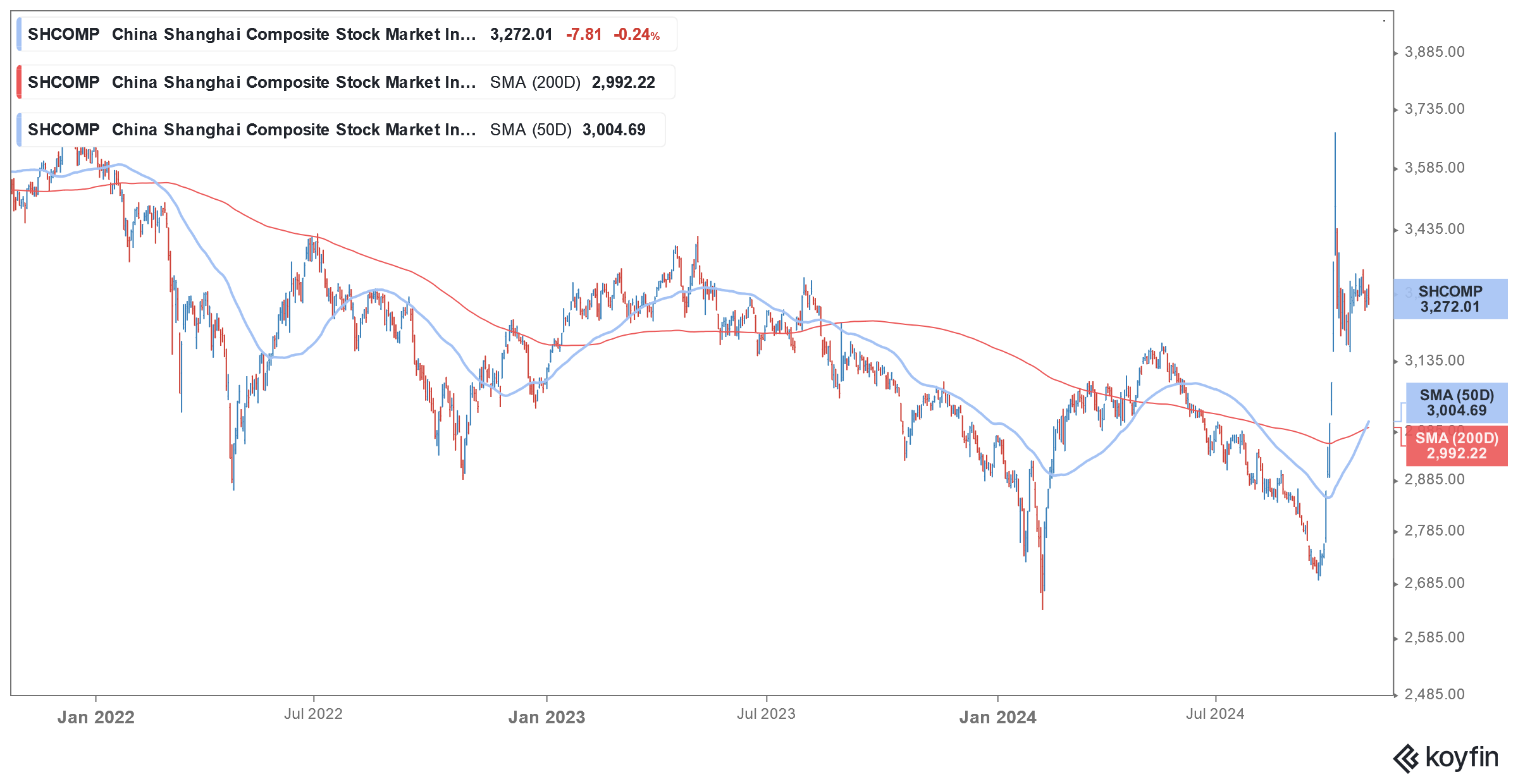Chinese Stocks Get a ‘Tactical Upgrade’ From Goldman Amid Stimulus Measures
Please note that we are not authorised to provide any investment advice. The content on this page is for information purposes only.
Goldman Sachs has “tactically upgraded” Chinese stocks amid a flurry of stimulus measures that the country has announced. At the same time, it has cut its view on Indian stocks and has a near-term bearish view on Japanese stocks.
Timothy Moe of Goldman Sachs said that the firm is raising its view on China “because of this policy shift which we’re characterizing as kind of taking out left-tailed risk to growth which could then result in a both a solidification of growth and earnings but also an improvement in valuation.”
Table of Contents
Chinese Stocks Have Spiked After a Flurry of Stimulus
Chinese stocks have outperformed global peers since mid-September after the company started unleashing a flurry of stimulus measures, both on the monetary as well as the fiscal side. The country began by loosening its monetary policy through multiple tools.
China also announced multiple fiscal measures to support the ailing housing and banking sectors. It would provide cash handouts to poor, increase child support and eased property ownership rules. These actions have spurred a rally in Chinese stocks which were otherwise underperforming global markets in the preceding decade.
Earlier this month, China’s Minister of Finance Lan Fo’an pledged more support for the economy but refrained from providing specifics on the size of the stimulus.
At his press conference, Lan said that more stimulus measures are on the table and stressed, “There are other policy tools that are being discussed that are still in the pipeline.” He also sought to allay fears that China’s high debt leaves little scope for fiscal stimulus and emphasized that “there is still relatively big room for China to issue debt and increase the fiscal deficit.”
China is Looking at More Fiscal Measures
The Chinese finance minister outlined four key policies to revive the world’s second largest economy. The country will increase support for debt-laden local governments and also issue special treasury bonds which it would use to strength the capital of state-owned banks. Strengthening the balance sheet of state-owned banks would help them increase their lending.
Moe meanwhile cautioned “you can’t say that just because there have been a parade of very high-profile press conferences and indications of policy accommodation that that sort of magically waves away all the macro concerns that that that the Market’s been focused on.”
Trump’s Reelection Is Seen a Risk for the Chinese Economy
Notably, Trump’s reelection is seen as a risk for the Chinese economy given the former president’s tough stance towards the country. The meeting of the Standing Committee of the National People’s Congress is set to be held between November 4 and November 8 where the country is expected to announce a stimulus package of upto $1.4 trillion.
The date of that meeting coincides with the US elections and analysts believe China might announce an even fat stimulus if Trump is reelected.
Chinese Economy Faces a Structural Slowdown
The Chinese economy is facing a structural slowdown amid an aging economy and sagging domestic consumption. The country’s investment-led growth model long lived its course and areas like real estate which were once the key pillars of the Chinese economy are now the weak links. The real estate slowdown is also putting pressure on the balance sheet of Chinese banks.
The recent data points have been mixed. Data showed that profits at China’s industrial firms fell 27.1% YoY in September which was the worst pace of decline since 2020 when the COVID-19 pandemic took a toll on the Chinese economy.
However, PMI data for November showed an expansion in manufacturing activity after five straight months of contraction. China’s export sector also faces structural challenges with many countries imposing tariffs on imports from the country.
Foreign Investors Are Flocking to Chinese Stocks
Many US investors shunned Chinese tech stocks in 2021 after the country’s brutal tech crackdown. While the country has since sounded a more reconciliatory tone towards large tech companies, for many investors Chinese tech stocks turned “uninvestable” considering the policy uncertainty.
That said, many US hedge funds including David Tepper’s hedge fund Appaloosa Management and Michael Burry’s Scion Asset Management increased stakes in Chinese stocks this year. Tepper in fact doubled down on Chinese stocks after the Fed’s rate cut and the bet has paid off amid the steep rise in Chinese shares.
Notably, in October several global funds cut their exposure to Indian stocks while raising their bets in Chinese stocks.
China Already Has a Bloated Debt Pile
While China has been announcing a flurry of measures, including fiscal spending, analysts believe that the country would need to be mindful of its already high debt pile. Speaking at the FutureChina Global Forum in Singapore, Bridgewater Associates founder Ray Dalio said, China would need “beautiful deleveraging” along with the stimulus measures.
“I think the changes that are taking place are terrific changes, but you still have to do the debt restructuring,” said Dalio.
He warned against throwing too much credit and money into the economy and said, “You need to do it correctly, and that’s as part of a restructuring. That becomes the challenging part of it. I think that will be the test.”
Meanwhile, after the initial bump, Chinese stocks have come off their 2024 highs. The country now faces a tough balancing task: On one hand, it needs to support its sagging economy while ensuring that its fiscal situation remains stable amid a soaring debt pile.






